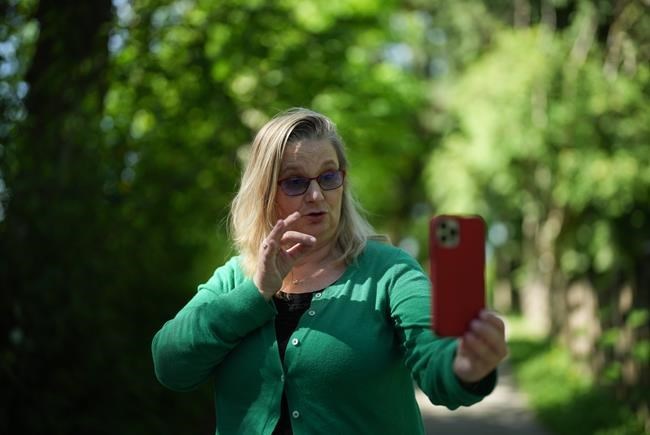How Mobile Carriers are Failing to Meet the Needs of Deaf and Hard of Hearing Canadians
Key Highlights :

For Lisa Anderson, a deaf woman living in Vancouver, the monthly data limit alert on her phone brings a sense of worry. Every megabyte of data is precious for Anderson, who relies on video calling applications for every mobile conversation. But due to data throttling — a common traffic management practice used by mobile carriers that reduces internet speeds — Anderson said exhausting her data allowance leads to “detrimental barriers.”
“The connection on my video is blurry. I’m faced with unclear video communication on one or both ends of the conversation. This impedes my sign language communication in emergencies, for example, when I’m outside of my home,” Anderson said in an email. “I have thoughts such as 'I hope I don’t have an emergency until the next billing cycle.' This is an added stress.”
As a June 1 deadline looms for major telecommunications companies to submit reports to the federal regulator on their accessibility efforts, advocates from the deaf, hard of hearing, blind and partially sighted communities say Canada's mobile carriers are falling short of meeting their needs. During the Canadian Radio-television and Telecommunications Commission (CRTC) consultations, major carriers maintained that throttling unlimited data plans “is necessary to maintain network quality for all customers” and that “even if there is a disadvantage, it is not undue” as video communication is data-intensive.
Anderson, a telecommunications accessibility consultant for the Deaf Wireless Canada Committee, said that while discounts are a positive first step, data packages should go beyond those offered to hearing consumers. “For deaf, deaf-blind or hard of hearing persons that use sign language, there is a dependence on video communication over wireless networks,” she said.
The Deaf and Hard of Hearing Coalition, which represents members in Ontario, Nova Scotia and Newfoundland and Labrador, said accessible plans should be capped at $35 per month and contain unlimited data, voice calling and texting with no overage fees, no throttling and zero-rating for use of video conferencing applications. Added Kimberly Wood, founder and chair of the Canada Deaf Grassroots Movement: “In a perfect world, a deaf or hard of hearing customer comes to a mobile company, we get to choose what kind of phone we would like to have and then be able to choose the accessibility plan with a good discount and unlimited data plan at ease without arguing or explaining what accessibility plans are.”
The Canadian Telecommunications Association said the industry is “committed to ensuring wireless services are accessible to all persons, including persons with disabilities.” Industry consultations found that a one-size-fits-all approach with mandated plans or service specifications was not the right way to proceed, said spokesman Nick Kyonka. “Like all Canadians, persons with disabilities are best served when service providers are able to offer their customers the ability to choose from a variety of plans and services to select the one that meets their needs.”
Bell spokeswoman Jacqueline Michelis noted the company offers additional discounts and promotions for persons with disabilities, including exclusive pricing on apps built specifically for accessibility needs. “We promote our accessibility discounts and add-ons in many ways, including on our websites and through our Accessibility Services Centre (which is a specialized team of customer service agents that are dedicated to assisting persons with disabilities) and in-store accessibility brochures,” she said in an email.
Meanwhile, Rogers spokesman Cam Gordon said customers with accessibility needs can receive support through its dedicated team. “We regularly engage Canadians to better understand their accessibility needs and we look forward to continued consultation, alongside persons with disabilities and industry partners, to reach our shared goal of removing barriers to this critical connectivity,” Gordon said in an email.
Telus spokeswoman Kalene DeBaeremaeker said the company “regularly consults with accessibility partners as well as people with disabilities incorporating their feedback to deliver products and services tailored to their needs.” She said Telus has partnered with March of Dimes, a rehabilitation and advocacy charity for people with physical disabilities, to support customers requiring professional assistance to independently use or control their mobile device.
All three companies highlighted their policy of zero-rating data from video relay services, which enables customers to communicate virtually through a sign-language interpreter free of charge and without the data counting toward their monthly allotment. Despite companies' statements, deaf and hard of hearing Canadians are still struggling to access the same mobile services as other Canadians.
Wood said that while she is encouraged by the CRTC's efforts to have carriers report on their accessibility efforts, she said it's important that the regulator also hold companies accountable. “We need to see tangible results and not just words on paper,” she said. “We have to make sure that the CRTC is making sure that these companies are actually doing what they say they’re going to do.”
